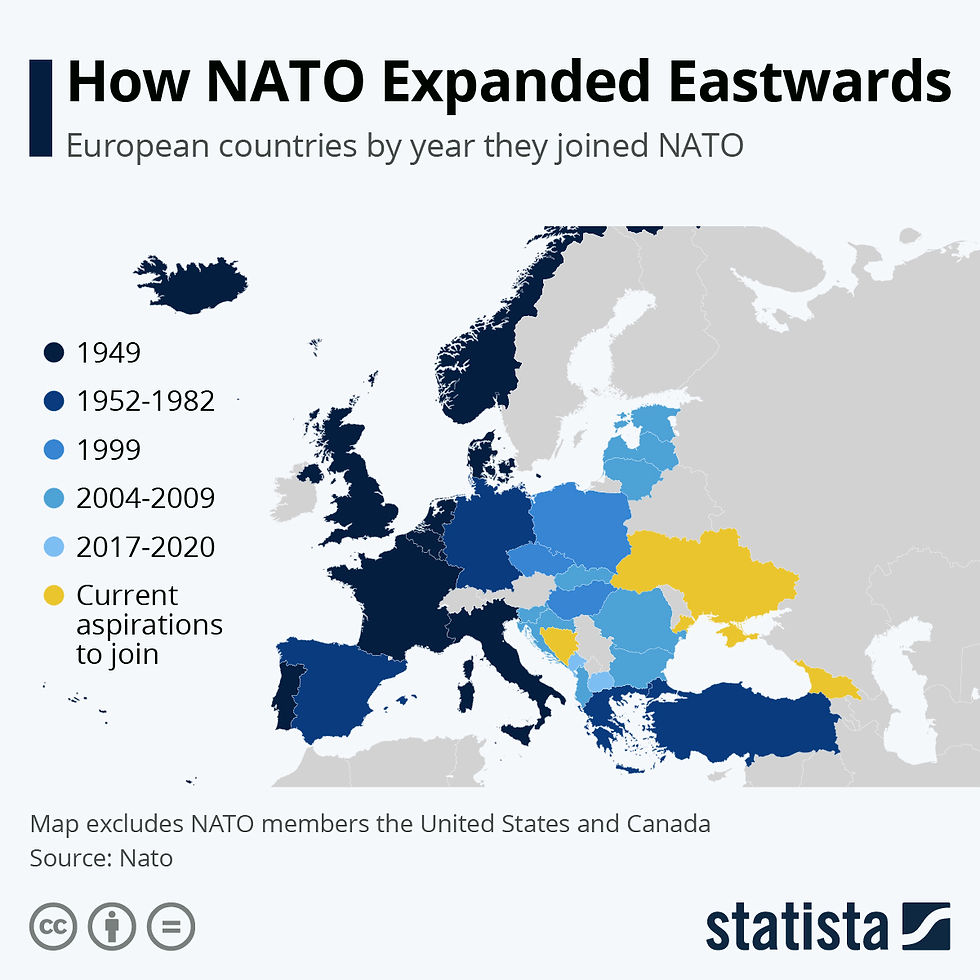Simply explained: Ukraine-Russia Crisis
- Samarth Modi

- Feb 28, 2022
- 4 min read
Simply told.

Just like any other crisis, conflict, and war - the Russia-Ukraine crisis has its quarrel planted in history. Admittedly the more pressing/short-run issues are regarding N.A.T.O. (North Atlantic Treaty Organization), strategic alliances, and military might; however - there is much more to uncover before getting into the present.
During the 9th Century - in Western Asia and Eastern Europe - a state named Kievan Rus' was formed. The state existed for about four centuries - currently - Belarusian, Russian, and Ukrainian cultural heritage is rooted back to this state. Moving to the Modern Era (roughly from the 1900s to 1940s) - during the rise of Soviet Republic - modern-day Russia and Ukraine were the Soviet Union's strongest member states.
The U.S.S.R. (Union of Soviet Socialist Republics) was arguably at its strongest during the Cold War - with Ukraine's geographical location, nuclear weaponry, and military bases making it a power-house during the late 20th Century. These developments, initially, placed Ukraine against the capitalistic West-World - due to the Soviet Republics' communist ideologies.
After the fall of the U.S.S.R. (Soviet Union) in 1991 - the Budapest Memorandum was signed in 1994. The Budapest Memorandum involved an agreement between Britain, Russia, Belarus, Kazakhstan, Ukraine, and the United States to respect Ukraine's independent status, sovereignty, and borders in exchange of the U.S.S.R.'s 1,900 nuclear warheads located in Ukraine.
Ukraine, however, was not coerced into such actions. On the contrary, it had assumed a neutral and politically stable status - a concept reflected in the 2013 rejection of E.U.'s economically integrative trade deal. Instead, Ukrainian President Viktor Yanukovych signed a $15 Billion bailout with Russia. However, the bailout went against the general "neutral" status and practically sold Ukraine to Moscow, resulting in public revolt. With Putin supporting the Yanukovych government and the E.U. supporting public revolt - the turmoil resulted in the upheaval of the Yanukovych reign. Retaliating the excessive E.U. support in Ukraine, Russian governors believed that the annexation of Crimea is justified.

Crimea is a peninsula located in the Black Sea; it was given to Ukraine from Russia by Nikita Khrushchev (Soviet Union - President) in 1954 to strengthen Russia-Ukraine "brotherhood". However, the fall of the Yanukovych government resulted in political misbalance for Vladimir Putin (Russia - President); to neutralise the misbalance - Crimea was captured and Russian presence in Eastern Ukraine continued to increase. However - to stop an escalating frontier - the Minsk Accords were signed in September 2014. These accords focussed on cease-fire and rebalancing the power in Eastern Europe. However, eight years later, the resolutions from the Minsk Accords are yet to be implemented. But the question is - why now?
Why are Russian troops on the Eastern Ukrainian borders?
To stop N.A.T.O. from expanding and Putin's political propaganda. Ukraine since 2017 - through some independent researches - is 70% inclined towards joining N.A.T.O. Russia - cannot allow a previous U.S.S.R. state to turn into a N.A.T.O. alliance - henceforth - it is attempting to use expansionism as its last resort. Moreover, by riling up a form of nationalism, Putin was able to utilise the annexation opportunity to revive Russia's "superpower" status.

Furthermore, there are varying justifications which have been brought up for Russian presence in Ukraine. Historically speaking - 1 in 6 Ukrainian is ethnically Russian and 1 in 3 Ukrainians speak Russian. Moreover, for 95% of its past, Ukraine has been controlled or guided by regimes residing in Russia. Hence, Putin's belief of Russia and Ukraine being "historically one state" is not wrong. However, past imperialism does not justify present expansionism. As this is the same as the United Kingdom claiming back all its previously colonised territories.
In addition - historically speaking - Catherine the Great, during the 18th Century, had forced Ukrainian schools to teach Russian and had shipped Russians to ethnically mingle with the Ukrainians. Hence, numerous historical perspectives can be brought to light to counteract the actions/justifications of the existing Russian president.
Yet - there are no justifications for breaking the Budapest Memorandum and the Minsk Accords. Therefore, regardless of the historical context - the present day scenario dictates the actions of states. Currently - Russian troops are getting further into Ukrainian territory as all economic sanctions prove to be insufficient. Moreover - China and Russia recently signed a $117.5 Billion oil trade deal - neutralising majority of the sanctions' impacts.
Henceforth, the Russia-Ukraine crisis is embedded in history - and is motivated by political strength. N.A.T.O.'s expansion is problematic for Russia, however, it has no justified methods of intervention. Therefore - it has moved to use military power in order to restrict further N.A.T.O. expansion. With sanctions proving futile, there are very few "peaceful" options remaining. Frankly speaking - there is very little which can be done - as military retaliation would result in worsened conditions as Russia is already activating nuclear weaponry. Time shall tell - all we can do is hope for the best.
*Disclaimer*
All information has been synthesised, over-simplified, and dumbed-down. Many other factors, aspects, perspectives, and characteristics have not been mentioned for simplicity sakes. I have written all the material. There is no conscious attempt at supporting either of the countries - all information is written in a "as unbiased as possible" form. If I do offend, hurt, or disturb any individual - please know that it was never the intention. Please feel free to reach out to me for any pressing edits or modifications to make the piece easier to read/consume.





Comments